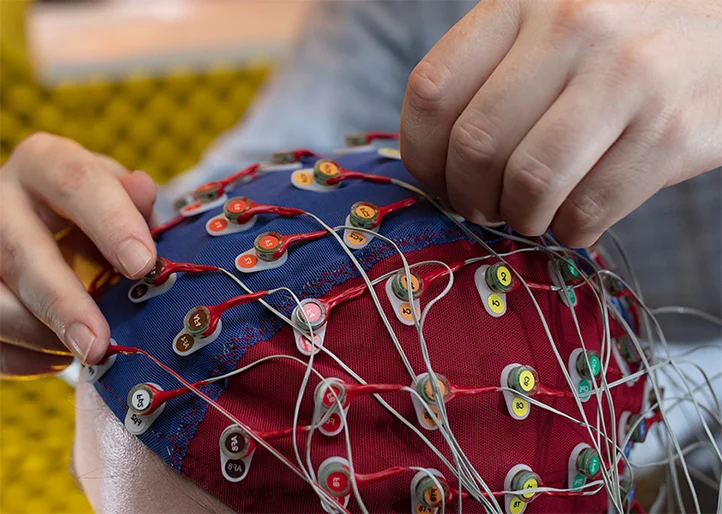Cognitive psychology is a branch of psychology that studies internal brain processes, including perception, attention, memory, and thinking, and examines how people understand, process, and remember information. Cognitive psychology uses scientific methods to explore thought processes and forms the foundation of many other psychological disciplines, such as educational, clinical, and social psychology.
Cognitive psychology emerged in the mid-20th century as a response to and complement to behavioral psychology, which focused on external and observable behavioral responses but largely ignored internal processes such as thinking and perception. This new direction gave rise to a broader “cognitive revolution” in science, marking a shift away from a strictly empirical approach to studying human behavior.
Ulric Neisser, often referred to as the “father of cognitive psychology,” outlined the key principles of this new discipline in his 1967 book “Cognitive Psychology.” He emphasized that the processes of perception, processing, and memory of information by people can be scientifically studied using experiments and behavioral pattern analysis.
Since then, cognitive psychology has significantly evolved and expanded its understanding of many aspects of human thought. Thanks to advances in neuroscience and brain scanning technologies, scientists have gained a better understanding of the connection between the brain and cognitive processes. This has led to the development of fields such as cognitive neuropsychology and cognitive neuroscience.
Today, cognitive psychology continues to play a crucial role in psychology and other fields, including artificial intelligence, linguistics, philosophy, anthropology, and education, providing key insights into how we think, learn, and perceive the world around us.

Key Concepts and Theories of Cognitive Psychology
One of the fundamental concepts of cognitive psychology is the idea of the brain as an information processing system. This concept compares the brain to a computer, where information is processed in a series of stages, including input (perception), storage (memory), and output (actions). This approach allows for the investigation of various internal processes that underlie behavior using rigorous experimental methods.
Another key concept in cognitive psychology is the idea of mental schemas. Schemas are simplified models of the world that shape our expectations and facilitate rapid and efficient perception. They determine how we encode and organize information and how we use this information to solve problems and make decisions.
Attention and Mindfulness
Attention and mindfulness are two important concepts in cognitive psychology.
- Attention refers to the brain’s ability to focus on specific stimuli from the environment while filtering out and ignoring others. This can involve concentrating on certain sounds in a noisy room or on a task being performed despite other potential distractions. Attention plays a crucial role in many aspects of cognitive processes, including perception, memory, and learning.
- Mindfulness refers to the ability to be “present” and focused on the current moment, fully aware of one’s thoughts, feelings, and perception of the environment. This state is often associated with the practice of meditation and mindfulness, and is considered beneficial for reducing stress and improving mental health. However, it is also an important concept in cognitive psychology, influencing how we perceive and interpret information.
Memory and Information Processing
Memory and information processing are two important concepts in cognitive psychology.
- Memory refers to the brain’s ability to retain and recall information. Cognitive psychologists typically divide memory into several types, including working memory (information we actively hold in mind), short-term memory (information we can remember for a few seconds or minutes without repetition), and long-term memory (information we remember for an extended period).
- Information processing is a concept that explains how the brain transforms incoming information for further use. This is usually represented as a sequence of stages that include perception (receiving information), encoding (transforming information into a form the brain can use), storage (retaining information in memory), and retrieval (accessing information in memory when needed). This concept is key to understanding many aspects of cognitive psychology, including learning, attention, and problem-solving.
Cognition and Thinking
Cognition and thinking are two major aspects of cognitive psychology.
- Cognition refers to the process of acquiring knowledge and understanding it through thoughts, experiences, and senses. It encompasses a wide range of processes, including perception, memory, attention, language, problem-solving, and decision-making. Cognitive processes involve everything related to information processing in the brain and influence our behavior, thinking, and feelings.
- Thinking, on the other hand, is a part of cognition and refers to the process of using mental abilities to form ideas, judgments, and conclusions. It can involve various types of thinking, such as critical (considering and analyzing information to form a rational judgment), creative (the process of generating new ideas or solutions), abstract (thinking beyond concrete and factual concepts), and concrete (thinking about specific and detailed things).
Perception and Visual Information Processing
Perception and visual information processing are key aspects of cognitive psychology.
- Visual information perception refers to the process by which the brain interprets and makes sense of incoming data from our senses. In the context of visual information, it refers to how we perceive and understand images and visual stimuli that we see. Perception involves a series of sub-processes, including attention (selecting important information for further analysis), recognition (identifying objects or images based on previous experience), and interpretation (assigning meaning to visual information in context).
- Visual information processing is the process by which the brain analyzes and interprets visual stimuli. It begins with the reception of visual information through the retina of the eye, which converts light signals into neural impulses. These impulses are then transmitted to various areas of the brain for further analysis and processing. This includes determining the shape, color, distance, movement, and location of objects, as well as their meaningful significance.
Decision-Making and Problem-Solving
Decision-making and problem-solving are two major areas of research in cognitive psychology.
- Decision-making refers to the process of choosing one of the possible courses of action when there are several alternatives. This process involves evaluating different options based on their potential outcomes and selecting the most preferred option. Decision-making is often associated with risk assessment and uncertainty, and its study helps to understand how people make choices in various situations, from everyday decisions to more complex and long-term planning.
- Problem-solving is another aspect of cognitive psychology that involves the process of finding a solution to a complex task or situation. This can involve various strategies, such as trial and error, an algorithmic approach (sequential application of specific steps or rules), and a heuristic approach (using shortcuts or “rules of thumb” to simplify the problem-solving process). Research in this area seeks to understand how people approach complex tasks and what strategies they use to solve them.
Language and Cognitive Linguistics
Language and cognitive linguistics are important areas of study in cognitive psychology.
- Language is a complex system of communication that includes various forms and modalities, such as written language, sign language, speech, and so on, which people use to express thoughts, ideas, and feelings. Cognitive psychology studies how we acquire, process, and use language. This includes understanding grammar, vocabulary, and semantics, as well as how we use language in the context of conveying meaning.
- Cognitive linguistics is a branch of linguistics that studies the relationship between language and thought. It explores how the brain forms the understanding and use of language and how language, in turn, influences our thinking and understanding of the world around us. Cognitive linguistics is concerned with issues such as categorization, metaphor, spatial orientation, and perspective, and how they relate to language and thought.

Research Methods in Cognitive Psychology
Cognitive psychology employs various methods to study mental processes. Central to this discipline are experiments that allow researchers to control and manipulate variables to examine their impact on cognitive functions. For example, these may include laboratory experiments where participants perform specific tasks, and researchers measure their responses.
Neuroimaging techniques, such as functional magnetic resonance imaging (fMRI) and positron emission tomography (PET), are used to gain a deeper understanding of brain function by visualizing brain activity during cognitive tasks. Other methods, such as electroencephalography (EEG) and psychophysiological measurements, also help link physiological activity to cognitive processes.
Experimental Method
The experimental method is one of the primary scientific research methods widely used in cognitive psychology. It is based on the principle of manipulating one or more variables and measuring their effect on other variables.
In an experimental study, scientists control and manipulate independent variables to determine whether they cause changes in the dependent variable. For example, a researcher may alter the level of attention (independent variable) and measure how this affects the process of memory retention (dependent variable).
A key feature of the experimental method is the control of independent variables and the random assignment of participants to groups. This allows researchers to claim that changes in the dependent variable result from manipulations of the independent variable, not from other factors.
Experiments can be conducted in laboratory settings, where researchers tightly control all aspects of the environment, or in “field” settings, where experiments are carried out in more realistic conditions but with less control over external factors.
Neuroimaging and Other Neuroscientific Methods
Neuroimaging and other neuroscientific methods play a crucial role in studying cognitive processes. These methods allow researchers to examine brain structure and function and link them to specific cognitive processes and behaviors.
- Functional Magnetic Resonance Imaging (fMRI) allows the visualization of activity in different brain areas in real time. It displays changes in blood flow in the brain in response to increased neuronal activity.
- Positron Emission Tomography (PET) is also used to study metabolic activity in the brain. During a PET scan, a radioactive isotope is injected into the bloodstream, which researchers then track to see which areas of the brain use more energy.
- Electroencephalography (EEG) measures the brain’s electrical activity using electrodes attached to the scalp. EEG provides information about the timing of specific cognitive processes.
- Magnetoencephalography (MEG) is similar to EEG but measures the magnetic fields generated by the brain’s electrical activity. MEG offers very precise temporal information and good spatial resolution.
- Transcranial Magnetic Stimulation (TMS) uses magnetic fields to stimulate or suppress activity in specific brain areas, allowing researchers to study the functions of these regions.
Computer Modeling and Artificial Intelligence
Computer modeling and artificial intelligence (AI) play an increasingly important role in cognitive psychology. They help create more detailed and accurate representations of various cognitive processes.
- Computer Modeling involves creating computer analogs of real-world systems or processes. In cognitive psychology, this may include modeling cognitive processes such as attention, memory, perception, and decision-making. These models are used to predict behavior in different situations and to test theories about how the brain works.
- Artificial Intelligence is applied in cognitive psychology in two main contexts. First, AI algorithms are used to model cognitive processes, especially in machine learning and neural networks. Second, cognitive psychologists study AI to better understand how the human brain solves complex tasks. For example, studying how AI learns to play chess or Go can help us understand how people learn and apply their strategies in these games.
In both contexts, computer modeling and AI provide powerful tools for studying and modeling cognitive processes, helping scientists better understand the workings of the human mind.
Cognitive Ethnography
Ethnography is a research method based on systematic observation of people’s behavior in their natural environment. Cognitive ethnography is an approach that combines the principles of cognitive psychology and ethnography.
In cognitive ethnography, researchers aim to understand how cultural and social factors influence cognitive processes such as thinking, perception, memory, and learning. Instead of conducting experiments in controlled laboratory settings, cognitive ethnographers work “in the field,” observing and analyzing people’s behavior in real situations.
For example, a cognitive ethnographer might spend months observing how doctors and nurses use electronic medical records in a hospital to understand how they process and use information in their practice. The goal is to improve our models of cognitive processes by taking into account the importance of context and culture.
Cognitive ethnography provides researchers with a valuable perspective, allowing them to study cognitive processes in more natural, realistic, and socio-cultural contexts.

Cognitive Psychology and Its Interaction with Other Disciplines
Cognitive psychology interacts with a number of other disciplines, enriching and deepening our understanding of cognitive processes. It is closely connected with neuropsychology and neuroscience, which provide a foundation for understanding the brain mechanisms underlying cognitive functions. It also interacts with linguistics, exploring the relationship between language and cognitive processes.
The relationship with artificial intelligence (AI) and computer science allows for the modeling of cognitive processes and the use of AI as a research tool. In the field of education, cognitive psychology research is applied to improve learning processes. Additionally, cognitive psychology intersects with philosophy, discussing issues of consciousness and the nature of thinking.
Cognitive Psychology and Neuroscience
Cognitive psychology and neuroscience are closely linked, as both disciplines aim to understand how the human mind and brain function.
Cognitive psychology focuses on studying the internal processes of the mind, such as attention, memory, perception, and thinking. It centers on how people understand, process, and remember information.
Neuroscience, on the other hand, deals with the study of the nervous system, including the brain. This discipline seeks to learn which specific brain structures and networks are responsible for various cognitive functions and processes.
Joint research between cognitive psychology and neuroscience often occurs in the field of cognitive neuroscience. Cognitive neuroscience uses neuroimaging technologies, such as functional magnetic resonance imaging (fMRI) or electroencephalography (EEG), to see which areas of the brain are activated during various cognitive tasks.
Thus, the interaction between cognitive psychology and neuroscience allows for a deeper understanding of how processes at the brain level (neurons, networks, brain regions) are related to cognitive functions and processes.
Cognitive Psychology and Artificial Intelligence
Cognitive psychology and artificial intelligence (AI) are interconnected in many areas, particularly when it comes to understanding and modeling thinking processes.
- Modeling Cognitive Processes: AI is often used to create models of cognitive processes. This can involve developing algorithms and systems that attempt to replicate some processes occurring in the human brain, such as learning, pattern recognition, problem-solving, and language comprehension.
- Studying Cognitive Processes: Conversely, cognitive psychology can provide a foundation for the development of artificial intelligence. Understanding how the human mind works can help create more sophisticated and effective AI systems.
- Application of AI in Cognitive Psychology: AI can also serve as an important tool for cognitive psychologists. For example, AI can be used to analyze large volumes of data and predict behavior.
Thus, cognitive psychology and artificial intelligence mutually enrich each other: psychology provides principles and theories that can guide AI development, while AI offers tools and technologies that help psychologists better understand cognitive processes.
Cognitive Psychology and Education
Cognitive psychology and education are closely related, as understanding cognitive processes has direct implications for effective learning and the development of teaching strategies.
- Learning Strategies and Teaching Methods: Research in cognitive psychology helps shape teaching methods that align with how students perceive, process, and remember information. For example, understanding attention, information processing, and memory contributes to creating learning methods that improve students’ comprehension and retention of information.
- Special Educational Needs: Cognitive psychology also plays a key role in diagnosing and treating students with special educational needs. Research on disorders such as dyslexia, attention deficit, and hyperactivity provides a deeper understanding of these conditions and suggests effective learning strategies for students facing these challenges.
- Motivation and Emotional Engagement: Cognitive psychology also helps to understand how motivation and emotions affect the learning process. Understanding this dynamic allows teachers to create a more stimulating and emotionally supportive learning environment.
Cognitive Psychology and Clinical Psychology
Cognitive psychology and clinical psychology interact on many levels, as understanding cognitive processes is essential for assessing, diagnosing, and treating mental disorders.
- Cognitive Therapy: One of the most prominent examples of this interaction is cognitive-behavioral therapy (CBT), which is based on the ideas of cognitive psychology and is used to treat a wide range of mental disorders, including depression, anxiety disorders, and post-traumatic stress disorder.
- Diagnosis and Assessment: Cognitive psychology also plays a key role in assessing and diagnosing mental disorders. Cognitive tests, such as neuropsychological testing, are used to assess cognitive functions (e.g., attention, memory, language, problem-solving abilities) and help diagnose various conditions, including dementia, anxiety, or affective disorders.
- Research and Understanding of Mental Disorders: Cognitive psychology also helps in the study of mental disorders. For example, studying cognitive processes contributes to understanding how the human brain processes information and how this process is distorted or disrupted in certain mental illnesses.
Thus, cognitive psychology makes a significant contribution to clinical psychology, providing tools and theories that help understand, diagnose, and treat mental disorders.
Cognitive Psychology and Economics
Cognitive psychology and economics intersect in a field known as cognitive economics, which studies how people make economic decisions and how their cognitive processes influence these decisions.
- Behavioral Economics: One example of this interaction is behavioral economics, which applies the principles of cognitive psychology to explain irrational or unexpected economic behavior. This includes the study of concepts such as judgment biases, the framing effect, and anchoring.
- Economic Decision-Making: Cognitive psychology also helps to understand the processes underlying economic decision-making. This includes studying risk perception, probability assessment, and temporal discounting.
- Consumer Behavior Research: Knowledge of cognitive psychology can be applied to study consumer behavior, including how they process product information, make purchasing decisions, and respond to advertising campaigns.
Thus, cognitive psychology enriches economics by providing valuable insights into how people perceive, process, and respond to economic information, which in turn helps predict and manage economic behavior.

Practical Applications of Cognitive Psychology
Cognitive psychology is widely applied in many fields, ranging from education to artificial intelligence. In an educational context, cognitive psychology helps develop teaching strategies that consider the functioning of memory, attention, and perception. This enhances the effectiveness of learning, promoting better retention and consolidation of material.
In the context of artificial intelligence and computer modeling, cognitive psychology assists in creating algorithms that mimic human cognitive processes, such as in the field of machine learning. Cognitive psychology is also applied in clinical practice, particularly within cognitive-behavioral therapy.
In Psychotherapy
Cognitive psychology and psychotherapy are closely linked, especially in the context of cognitive-behavioral therapy (CBT). Cognitive psychology studies how people perceive, remember, learn, think, and interact with their environment. It provides psychotherapists with essential tools to understand and change thought processes that may contribute to mental disorders.
Cognitive psychology has become the foundation for the development of CBT, one of the most effective approaches to psychotherapy. In CBT, therapists use principles of cognitive psychology to help patients recognize and change negative or destructive thought processes that can lead to depression and anxiety.
Thus, cognitive psychology plays a central role in modern psychotherapy, offering a detailed understanding of cognitive processes that can be used to help people combat mental health issues and improve their psychological well-being.
In Education and Pedagogy
Cognitive psychology, which explores thinking processes, perception, memory, attention, and learning, has direct relevance to education and pedagogy.
In an educational context, cognitive psychology helps educators understand how students process information and use this knowledge to improve the learning process. For example, understanding the structure and functioning of memory allows for the development of more effective memorization techniques.
In the context of pedagogy, cognitive psychology aids in the development and evaluation of teaching methods and strategies. For instance, the introduction of the concept of “active learning,” which involves the active participation of students in the learning process, is based on cognitive psychology.
Therefore, cognitive psychology is an important tool for teachers and educators who strive to optimize the learning process to achieve better educational outcomes.
In Interface Design and User Experience Enhancement
Cognitive psychology plays a crucial role in interface design and user experience (UX) enhancement. Understanding how users perceive information, make decisions, and interact with technology enables designers to create more intuitive and user-friendly interfaces.
Attention to details such as colors, shapes, element placement, and other design aspects significantly influences how easily users can find the information they need and perform necessary actions. Additionally, understanding cognitive processes helps designers predict and minimize potential difficulties that users may encounter.
Cognitive psychology is also essential in conducting UX research, helping to interpret user behavior and feedback. This, in turn, allows for the improvement of products and services, making them more appealing and convenient for end users.
In Advertising and Marketing
Cognitive psychology has a profound impact on advertising and marketing. Understanding how consumers perceive information, the thought processes they undergo when making purchasing decisions, and how their preferences and attitudes toward brands are formed enables marketers to create more effective advertising campaigns.
Key principles of cognitive psychology, such as perception, attention, memory, emotions, and cognitive biases, are used to capture the audience’s attention, create persuasive messages, foster positive brand associations, and stimulate purchasing behavior.
Advertising campaigns based on an understanding of cognitive processes are more targeted and personalized, which increases their effectiveness and return on investment. This also aids in creating more ethical and socially responsible advertising strategies.

A Critical Perspective on Cognitive Psychology
Despite its significant achievements and contributions to our understanding of human thought, cognitive psychology remains the subject of criticism for various reasons. Here are some of them:
- Excessive Focus on Internal Processes: Critics argue that cognitive psychology is too focused on internal processes such as perception, memory, and thinking, while insufficiently considering external social and cultural factors that can significantly influence these processes.
- Modeling Human Thinking After Computers: Cognitive psychology often uses computer analogies to explain human thought, portraying the mind as a kind of information processor. However, critics believe that this approach oversimplifies the complexity of the human mind and ignores important aspects such as emotions, intuition, and creativity.
- Experiments: Many studies in cognitive psychology are conducted in laboratory settings, raising questions about the validity and applicability of the findings. Critics claim that human behavior in a lab significantly differs from behavior in real life.
- Determinism: Another area of criticism concerns the deterministic nature of cognitive psychology, which suggests that behavior is largely determined by internal cognitive processes. This implies insufficient respect for free will and the impact of unique life circumstances and experiences on thinking and behavior.
- Lack of a Unifying Theory: Finally, critics note that cognitive psychology lacks a comprehensive theory that explains all aspects of human thinking. Instead, it consists of various models and theories, each addressing specific aspects of cognitive processes.
Responses to the Criticism
The responses to the criticism of cognitive psychology are equally diverse. Here are some of them:
- Balancing Internal and External Processes: In response to the criticism that cognitive psychology is overly focused on internal processes, many scholars point out that they actually strive to balance internal and external processes. In this context, cognitive science, which actively studies the interactions between individual cognitive processes and social and cultural factors, is gaining popularity.
- Computer Analogy: While many critics oppose the use of computer analogies, scholars argue that it is simply a model or metaphor that helps explain complex processes. They assert that a model does not need to be an exact replica of reality to be useful.
- Research Methodology: Regarding the criticism of laboratory research, many scholars acknowledge the importance of conducting studies in real-life settings and are developing research methods that better reflect everyday behavior.
- Influence on Behavior: Despite the criticism of determinism, many cognitive psychologists emphasize that they do not ignore the role of free will and personal choice. They argue that understanding cognitive processes actually helps people make more informed and productive choices in their lives.
- Unifying Theory: Finally, in response to the lack of a comprehensive theory, many scholars state that the diversity of theories and models is a strength of cognitive psychology. It allows for a multifaceted approach to studying human thought, leading to more profound and comprehensive insights.

Possible Future Directions in Cognitive Psychology Research
- In-Depth Study of Neuroscience: With the advent of new technologies and methods, neuroscience is increasingly involved in the study of cognitive processes. A deeper understanding of brain function may open new horizons for cognitive psychology.
- Integration with Artificial Intelligence: As artificial intelligence becomes more complex and advanced, cognitive psychology may play a key role in understanding and developing such systems. Research in this area will enrich our understanding of our own cognitive processes.
- Greater Attention to Social and Cultural Aspects: In the future, cognitive psychology is likely to pay more attention to the relationship between individual cognitive processes and social and cultural contexts.
- Considering the Impact of Technology: Technology is exerting an ever-greater influence on our lives, raising new questions and challenges for cognitive psychology. How do technologies affect our perception, thinking, and memory? How can we adapt to new technologies, and are they capable of changing our brain and cognitive processes?
- Personalization of Learning and Psychotherapy: With a deep understanding of cognitive processes and individual differences, more effective and personalized approaches will be developed in education and psychotherapy.
Overall, cognitive psychology will continue to evolve, adapt, and grow in response to new questions and challenges in the future.




